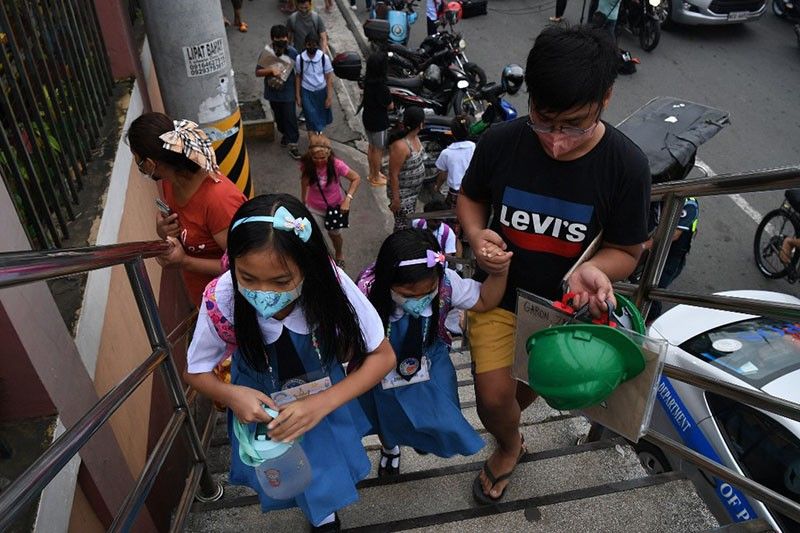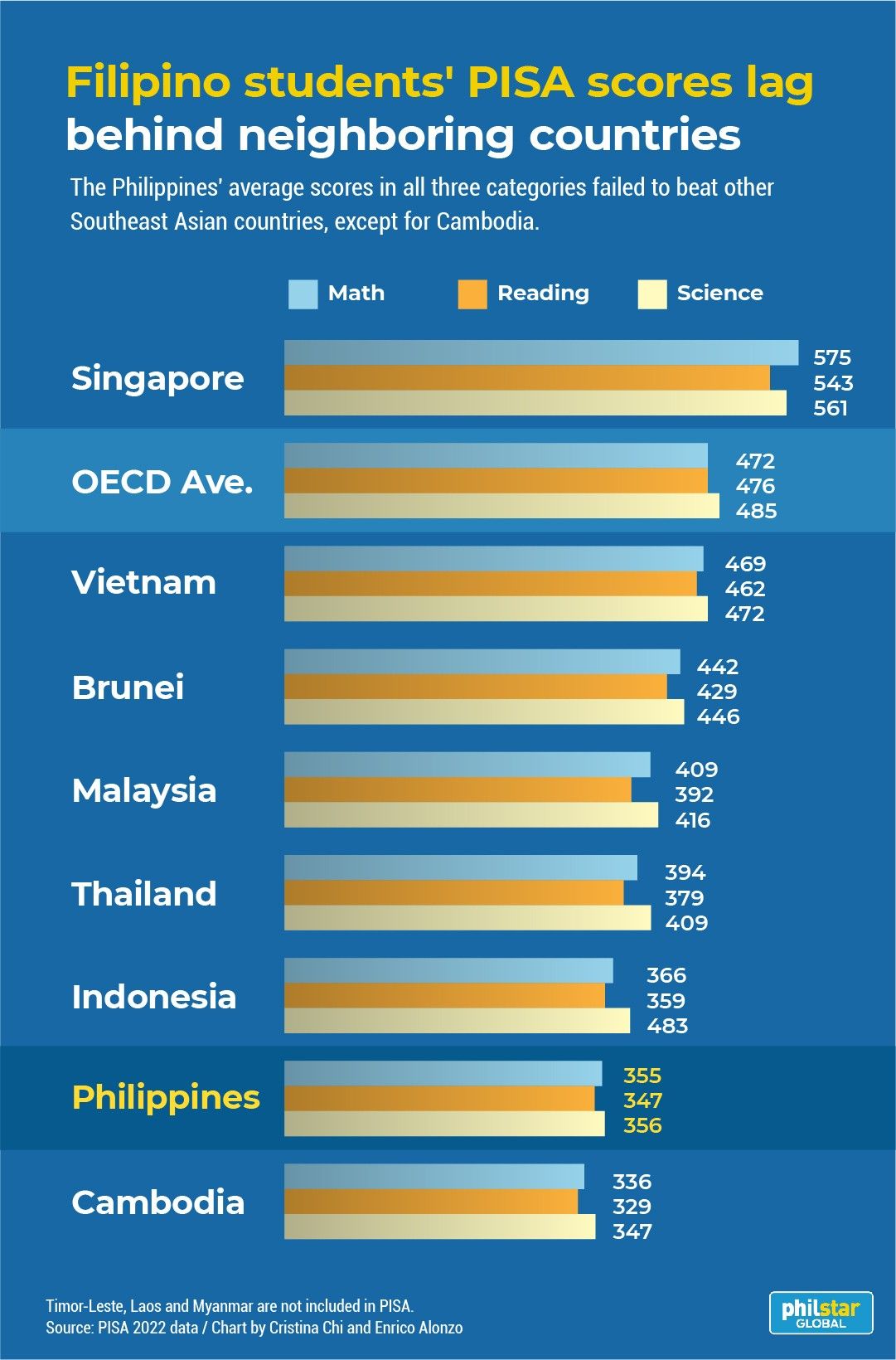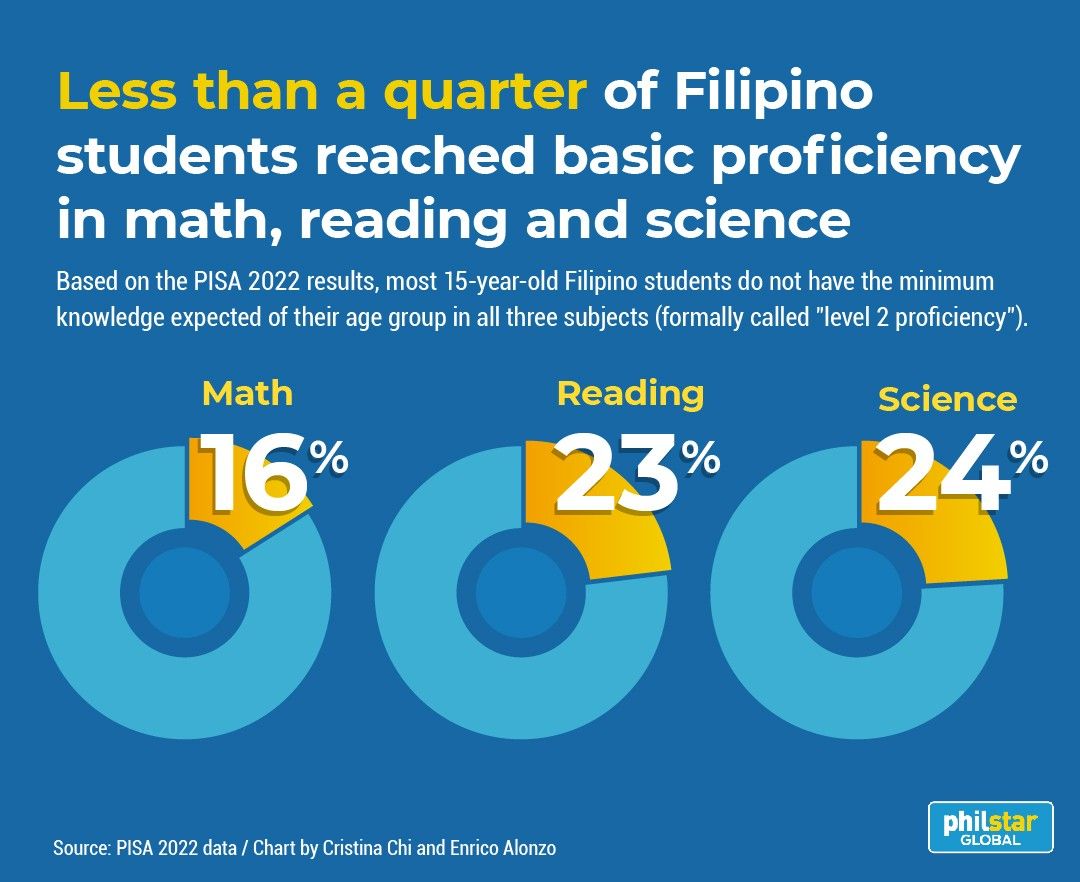Philippines still lags behind world in math, reading and science — PISA 2022

MANILA, Philippines (Updated 5:04 pm) — Students in the Philippines remain among the world’s weakest in math, reading and science, new findings by the Program for International Student Assessment (PISA) showed, with recent test scores showing no significant improvement from the country’s performance in 2018.
Despite the education department’s firestorm of reforms and preparations following a dismal showing in PISA 2018, just less than a quarter of Filipino students who took the test in 2022 reached the minimum level of proficiency in all three subjects of math, reading and science, according to PISA results released on Tuesday.
Similar to 2018, the latest PISA scores show the Philippines performed worse than the global average in all categories, with its placement in the country rankings moving up by just a few spots above countries that dropped ranks due to the pandemic’s impacts on student learning.
The latest results also come off the back of the Philippine education system’s slow climb out of the pandemic — a prolonged period of school closure that resulted in learning losses and a ballooning number of students who cannot read.
The Department of Education released a statement before the public release of the PISA 2022 results and said that it was not expecting a “good” outcome.
PISA, which is conducted by the Organisation for Economic Co-operation and Development (OECD), has been evaluating the literacy of 15-year-olds every three years since 2000. The latest cycle, which involved 81 countries, was postponed by a year due to the COVID-19 pandemic.
The test is designed to evaluate the literacy of 15-year-olds as this is typically the age at which most students are still enrolled in formal education.
The results of PISA 2022 are one of the first international assessments to capture the impact of the COVID-19 pandemic on most education systems in the world, with OECD noting that there was a drastic decline in student performance across nations unprecedented in its history.
The Philippines only joined PISA in its 2018 cycle.
Below global average
To recall, former Education Secretary Leonor Briones expressed indignation over the World Bank’s citation of the 2018 PISA results in a 2021 report on students’ pandemic learning, saying that the international body had then used “outdated data.”
But there was no significant difference in the Philippines’ performance in PISA 2022 compared to 2018, with the country’s average score in all categories changing by just single digits. The Philippines' scores are also still below the OECD average and
The Philippines scored two points better in mathematics, the highlight of PISA 2022, going from 353 in 2018 to 355 in 2022.
For science, the Philippines’ average score dropped by one point from 356 to 355.
The Philippines had the biggest improvement in reading but just by seven points, scoring 347 from 340 in 2018.
Changes in PISA scores have to be at least 20 points to be equivalent to the learning gains or losses of at least a year's worth of schooling, while one to two-point changes are not considered significant, according to the OECD.
Based on the Philippines' gap from other countries, Filipino students appear to trail behind their global counterparts by an average of five to six years' worth of schooling, said Alexander Sucalit, a senior education program specialist at the Department of Education (DepEd).
Sucalit's statement was made during a press conference on Wednesday and is based on the OECD's estimations in the PISA report.
The DepEd official pointed out that the OECD's analysis should be interpreted "cautiously" as "different countries have different paces of learning."

Compared to 81 countries, the Philippines now ranks sixth-lowest in both mathematics and reading, while it now ranks third-lowest in science. This is higher than its placement in the 2018 cycle, when Filipino students ranked lowest in reading comprehension and the second-lowest in mathematics and science.
In mathematics, specifically, the Philippines ranked above countries like Cambodia (lowest in the world in all areas) and the Dominican Republic (third lowest), but countries like Palestine (13th-lowest) and Indonesia (12th-lowest) outperformed the Philippines.
Minimum proficiency
Based on the PISA test results, only 16% of Filipino students attained at least the basic or baseline level of proficiency in mathematics (labeled in the report as “level 2 proficiency”).
This means that just about one out of five Filipino students who participated in PISA “can interpret and recognize, without direct instructions, how a simple situation can be represented mathematically.”
This means that 84% of Filipino students who took the test do not have sufficient mathematical skills to “(compare) the total distance across two alternative routes, or converting prices into a different currency” — examples given by PISA of basic math competencies.
Meanwhile, only 24% or just about one out of four Filipino students who took the PISA exam reached basic reading proficiency.
This means that just 24% of students in the Philippines can, at the very least, "identify the main idea in a text of moderate length" and reflect on the purpose and meaning of what they are reading.
Similarly, just 23% of students in the Philippines reached a basic proficiency in science. This means only one out of four Filipino students in PISA 2022 had the skills to "recognize the correct explanation for familiar scientific phenomenon” and validate conclusions.

Gender differences
While boys outperformed girls in mathematics in more countries globally, the Philippines tells a different story.
According to PISA, female Filipino students outperformed male students in mathematics by 14 score points.
“In the Philippines, the share of low performers is larger among boys (86%) than among girls (82%) in mathematics,” PISA noted.
More boys also scored lower than girls in reading, with 82% of male students scoring below level 2 proficiency in reading compared to 71% of girls.
K to 12 impact? Expert cautions against hasty conclusions
Pam Robertson, the deputy director of the Assessment, Curriculum and Technology Research Centre (ACTRC), noted that the K to 12 mathematics curriculum was designed that way to respond to earlier observations that math classes focused too much on memorizing computational steps rather than problem-solving and other higher-order thinking skills.
In an email interview with Philstar.com, Robertson explained that the K to 12 curriculum had "less emphasis on performing routine mathematical processes than the Singaporean curriculum," which was the only other available curriculum suitable for comparison, based on ACTRC’s review.
“This suggests that the K to 12 curriculum had overcompensated a little in its attempt to address the previous failing,” said Robertson, stressing that the K to 12 curriculum was also designed to align the Philippines with the rest of the world.
Robertson also noted that the students who participated in PISA 2022 were the first to complete all grade levels under the K to 12 curriculum, which was introduced a decade ago in 2013.
But the dismal PISA scores in 2018 and 2022 do not immediately indicate anything about the K to 12 curriculum, Robertson cautioned, as “the rollout of the K to 12 curriculum didn’t finish until 2018.”
“(It) will be many years before the true impact of that curriculum can be seen in the trends in international test results,” Robertson said in an email interview with Philstar.com.
International studies have shown that it usually takes around 10 years for changes in the curriculum to have a noticeable effect on large-scale test results like PISA, Robertson added.
DepEd under Duterte has already started the rollout of a new curriculum for Kinder to Grade 10, which will be implemented in phases starting 2024.
- Latest
- Trending































